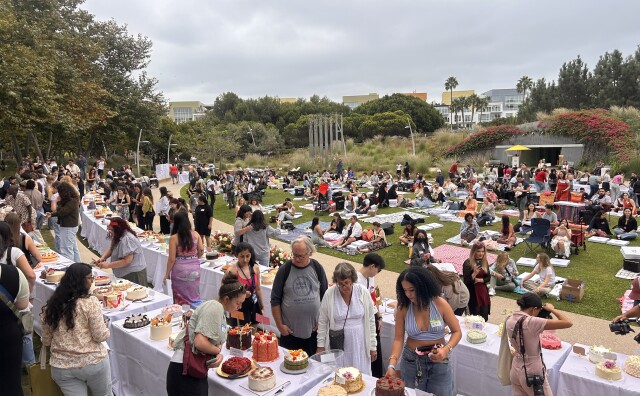Congress has cut federal funding for public media — a $3.4 million loss for LAist. We count on readers like you to protect our nonprofit newsroom. Become a monthly member and sustain local journalism.
8 billion humans and counting: What it means for the planet's future

It took 300,000 years for the human population to grow to one billion souls.
We hit that milestone in the early 1800s. And then, that growth curve took off like a rocket.
Only 200 years later, we’ve grown to 8 billion. And there’s hot debate about what comes next.
“There really only been two camps. There’s been this camp that says there are too many people in the world,” Jennifer Sciubba says.
“But on the other side, there are folks who say the more people we have, the more potential geniuses we’ll have, the more innovation we’ll have.”
And that has been true, thus far. But every natural system has a carrying capacity.
“We can either engineer a controlled contraction back to a situation of relative equilibrium with the natural environment, or nature will do it for us as it does with every other species,” William Rees says.
Today, On Point: Population growth, economic growth and environmental balance.
Guests
Jennifer Sciubba, demographer who focuses on global demographic trends. Fellow at The Wilson Center. Author of 8 Billion and Counting: How Sex, Death, and Migration Shape Our World. (@profsciubba)
William Rees, professor emeritus of ecological economics and human ecology at the University of British Columbia.
Also Featured
Andat Dasogot, head of the Population and Development Unit at the United Nations Population Fund in Abuja, Nigeria.
Winnie Mitullah, professor of Development Studies and chair of UNESCO’s higher education network at the University of Nairobi, in Nairobi, Kenya.
Elizabeth Hadly, Global change scientist at Stanford and Director of the Jasper Ridge Biological Preserve.
Book Excerpt
Reprinted from 8 Billion and Counting: How Sex, Death, and Migration Shape our World by Jennifer D. Sciubba. Copyright © 2022 by Jennifer D. Sciubba. Used with permission of the publisher, W. W. Norton & Company, Inc. All rights reserved.
This article was originally published on WBUR.org.
Copyright 2023 NPR. To see more, visit https://www.npr.org. 9(MDA1OTI3MjQ5MDEyODUwMTE2MzM1YzNmZA004))
As Editor-in-Chief of our newsroom, I’m extremely proud of the work our top-notch journalists are doing here at LAist. We’re doing more hard-hitting watchdog journalism than ever before — powerful reporting on the economy, elections, climate and the homelessness crisis that is making a difference in your lives. At the same time, it’s never been more difficult to maintain a paywall-free, independent news source that informs, inspires, and engages everyone.
Simply put, we cannot do this essential work without your help. Federal funding for public media has been clawed back by Congress and that means LAist has lost $3.4 million in federal funding over the next two years. So we’re asking for your help. LAist has been there for you and we’re asking you to be here for us.
We rely on donations from readers like you to stay independent, which keeps our nonprofit newsroom strong and accountable to you.
No matter where you stand on the political spectrum, press freedom is at the core of keeping our nation free and fair. And as the landscape of free press changes, LAist will remain a voice you know and trust, but the amount of reader support we receive will help determine how strong of a newsroom we are going forward to cover the important news from our community.
Please take action today to support your trusted source for local news with a donation that makes sense for your budget.
Thank you for your generous support and believing in independent news.

-
Administrators say the bargaining units should be dismissed, or that they have no standing. One campus is going after the federal agency in charge of union activity.
-
The landslide is not connected to the greater Portuguese Bend landslide, city officials said.
-
Nom. Nom. Nom. The event destroyed the internet when it was first announced — and sold out in minutes.
-
The critical findings are part of long-awaited after-action report was released Thursday. It contains recommendations for increasing emergency staffing and updating old systems.
-
Diving has changed, mountain biking has been added. Here's where to watch the Olympics in person in 2028.
-
'A Great Day in the Stoke' is a free, daylong event in Orange County billed as 'the largest gathering of Black surfers in history.' The fourth annual festival is set for Saturday in Huntington Beach.







